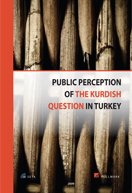Public Perception of the Kurdish Question” is based on a Turkey-wide survey conducted by the Foundation for Political, Economic and Social Research (SETA) and Pollmark. The main objective of this large-scale survey was to map public perceptions of the Kurdish question and the government’s intensively debated Democratization Initiative or in other words, Kurdish Initiative. This report presents the main findings of the survey.
This is not the first time that Turkish public is discussing the Kurdish question and it seems that this issue will remain an important item on the agenda for years to come. However, understanding the emerging dynamics and new dimensions of the problem has become extremely complicated in light of recent events and developments. Today, there is almost a completely new context in the approaches to Kurdish question as far as the political dynamics and grounds for discussion are concerned. Undoubtedly, this new ground builds upon the tensions, successes, failures and transformations in the last twenty-five years.
At this present time, however, it is no longer possible to use the language and rhetoric that were employed during the past ten or twenty years. To put it more precisely, the framework used to discuss the Kurdish question will have to differ in the future in order to pursue a meaningful debate. It is not an overstatement to describe the current period as the beginning of such a transformation. The most important characteristic of this new period is that the Kurdish question is increasingly considered a political problem by the public in contrast to the previous perspectives, which used to take the issue essentially as a security problem.
The importance of this survey lies in its ability to clearly capture the picture of this transitional period. At the same time, the report touches on the structural and periodic features of the Kurdish question and discusses how the public perceives all these variables. This research presents voluminous data on how Turkish society perceives the Kurdish question, where it sees the solution, what the public thinks about the positions of the ruling and opposition parties towards the new initiative. It also documents what Turkish people think about the origins of the Kurdish question and demonstrates the common values that can facilitate social integration in Turkey. We believe that the data presented in this report will increase the quality of discussion on this issue by enabling the readers to see different aspects of the problem.
***
Exective Summary The survey revealed that public perception of the Kurdish question in Turkey has three essential features. The first significant finding is that the majority of society views the Kurdish issue as the most important political issue in Turkey. Moreover, great majority of the respondents upholds that policies focusing on the security dimension of the problem alone in the last 25 years have failed. In stark contrast to that, the majority of people put responsibility on political actors such as political parties, government and the Grand National Assembly of Turkey (TBMM), and expect them to take action for the settlement of the Kurdish question. In this context, the results show that there is strong public support to the Kurdish Initiative and majority of society does not approve the policies of the Republican People’s Party (CHP) and the Nationalist Movement Party (MHP) towards the initiative. The second significant finding of the survey is the presence of strong integration between citizens who describe themselves Kurds and Turks. The research shows that roughly every one out of three Turks has a Kurdish frie


